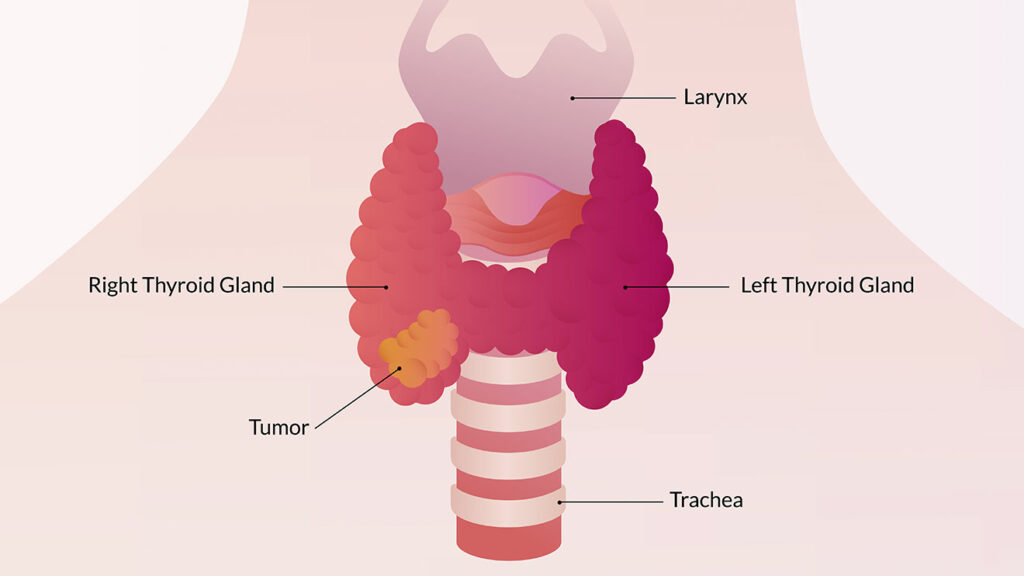
- What is thyroid cancer?
- Types of thyroid cancer
- How common is thyroid cancer?
- What causes thyroid cancer?
- Diagnosing thyroid cancer
- Treatment of thyroid cancer
- What are the symptoms of thyroid cancer?
- How is thyroid cancer diagnosed?
- What are the complications of thyroid cancer?
- What are the risk factors for thyroid cancer?
- Which genetic mutations are associated with thyroid cancer?
- Who should have genetic testing for thyroid cancer?
What is Thyroid Cancer?
Thyroid cancer begins in the thyroid gland cells, a butterfly-shaped organ located at the base of the neck, just below the Adam's apple. The thyroid gland produces hormones that regulate various bodily functions, including metabolism. Thyroid cancer develops when abnormal cells within the thyroid gland undergo uncontrolled growth and division, leading to the formation of a tumor.
Types of thyroid cancer
There are several types of thyroid cancer, and they are classified based on the specific cells involved. The most common types include:
Papillary Thyroid Cancer (PTC): This is the most common type, accounting for a majority of 80 to 85 percent of thyroid cancer cases. This type of cancer can spread to lymph nodes near the neck, but it usually grows slowly, and when detected early and with treatment a patient may have a good prognosis.
Follicular Thyroid Cancer (FTC): FTC is the second most prevalent type of cancer. It tends to be more aggressive than papillary cancer and may spread to nearby organs like the lungs or the bones.
Medullary Thyroid Cancer (MTC): This type originates from the C cells of the thyroid gland, which produce a hormone called calcitonin. Around 4 to 10% of thyroid cancers are found to be of this type. MTC tends to metastasize to lymph nodes and other organs compared to other forms of thyroid cancers.
Anaplastic Thyroid Cancer: This is a rare but highly aggressive form of thyroid cancer that often has a poor prognosis. It grows rapidly and quickly spreads to other parts of the neck and the body.
How common is thyroid cancer?
Thyroid cancer is relatively uncommon compared to other types of cancer, as it is often diagnosed at an early age. This cancer seems three times more common in women than in men.
What causes thyroid cancer?
No sure cause of thyroid cancer has been found. Some factors that increase the risk include low sodium in the diet, radiation exposure, and faulty genes. However, other risk factors include inflammation in your thyroid gland, enlarged thyroid (goiter), family history of thyroid cancer, and exposure to high levels of radiation.
What are the symptoms of thyroid cancer?
Symptoms of thyroid cancer can include a lump or swelling in the neck, difficulty swallowing, changes in voice, persistent neck pain, and enlarged lymph nodes. However, early-stage thyroid cancer may not present noticeable symptoms.
How is thyroid cancer diagnosed?
The diagnostic process for thyroid cancer may include the following steps:
Physical examination:
The doctor will check the neck for any lumps, swelling, or abnormalities in the thyroid gland.
Imaging Tests:
Ultrasound: This non-invasive imaging test uses sound waves to create a picture of the thyroid gland. The high-frequency sound waves in ultrasound imaging generate echoes that provide the doctor with detailed insights into the size of the thyroid gland. This imaging technique also discerns information about nodules, distinguishing between solid masses and fluid-filled cysts.
Blood tests:
Blood tests are taken to measure levels of certain thyroid hormones and to check for specific markers associated with thyroid cancer, such as calcitonin and carcinoembryonic antigen (CEA). Blood tests may include testing for TSH, Thyroid hormone levels(T3 and T4), Tg and TgAb.
Biopsy:
A biopsy for thyroid cancer involves the removal of a small tissue sample from the thyroid gland for examination. Fine Needle Aspiration (FNA) biopsy, is a common biopsy where a thin needle extracts cells from a thyroid nodule. The sampled tissue is then analyzed under a microscope to determine if cancer cells are present, aiding in the diagnosis and treatment planning for thyroid cancer.
Thyroid scan:
In some cases, a thyroid scan may be performed to evaluate the function and activity of the thyroid gland.
Genetic testing:
For some individuals with a family history of thyroid cancer or certain risk factors, genetic testing may be considered to identify any genetic mutations that are associated with an increased risk.
Once a diagnosis is confirmed, additional tests may be performed to determine the extent (stage) of the cancer and help guide the treatment plan. Individuals with suspected thyroid issues or symptoms need to consult with a healthcare professional for proper evaluation and diagnosis.
Who should have genetic testing for thyroid cancer?
Genetic testing is advised for individuals with two or more first-degree relatives (parents or siblings) diagnosed with thyroid cancer, indicating a potential hereditary risk. Additionally, a swiftly growing neck mass prompts consideration for genetic testing, as both scenarios suggest an elevated likelihood of thyroid cancer.
References
- American Cancer Society What is Thyroid Cancer
- Cancer Research UK Thyroid Cancer
- WebMD Thyroid Cancer symptoms, causes and treatment
- National Cancer Institute Thyroid cancer treatment

